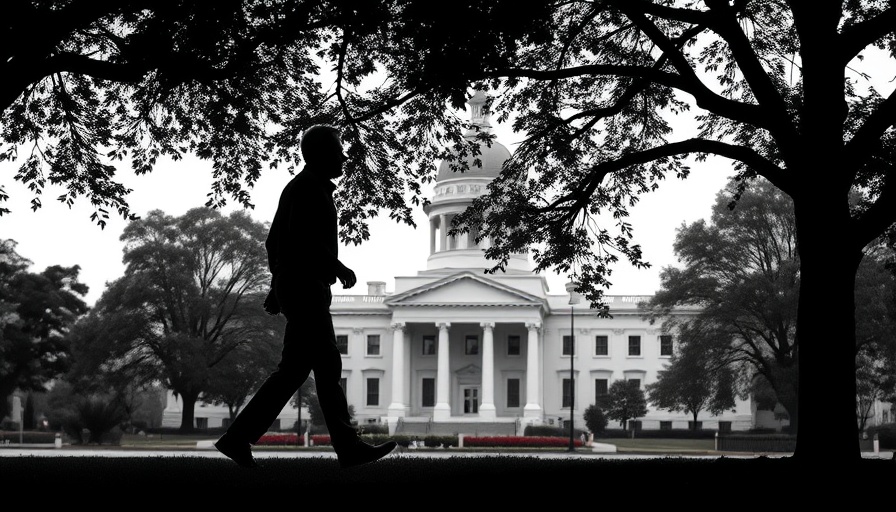
Unpacking the Supreme Court's Ruling on Texas Porn ID Law
The recent Supreme Court decision upholding the Texas age verification law has propelled a long-standing debate on internet privacy and free speech into the spotlight. In a landmark 6-3 ruling, the justices determined that this law, designed to ensure viewers of pornographic sites are at least 18 years old, is constitutional. This ruling does not just affect Texas; its ramifications could resonate across the entire United States and set precedents for future legislation on online content.
A Closer Look at the Texas Law
The Texas law, officially known as HB1181, mandates that adult websites verify the age of their users before granting access to content deemed inappropriate for minors. Websites that fail to comply face substantial fines—up to $10,000 per day and potential penalties totaling $250,000. While the majority of the justices deemed the law a reasonable constraint protecting minors, dissenting voices, notably from Justice Elena Kagan, argued that the law infringes on First Amendment rights by erecting barriers for legal adult access to protected content.
The Broader Implications for Privacy and Free Speech
This ruling raises significant concerns regarding digital privacy and the potential for overreach in governmental regulation of online content. Critics from digital rights organizations argue that the enforcement mechanisms tied to such age verification laws could lead to invasive practices including the collection of personal data. In questioning the future of personal privacy online, Martin Dempsey, an internet privacy advocate, posits that regulating adult access to sexually explicit material is not merely a legal issue, but an infringement of fundamental rights protected under the Constitution. “When we start placing age verification mechanisms on adult content, it opens the door to greater surveillance,” Dempsey emphasizes.
The Growing Trend of Age Verification Laws
Following Texas’s lead, more than half of U.S. states have considered or enacted similar age verification requirements. These trends suggest a movement toward stricter regulations on various types of online content, particularly in the realms of pornography and explicit materials. Some see these efforts as part of a larger agenda to control free speech online. As Jess Miers, a legal scholar at the University of Akron, suggests, “What starts as age verification could evolve into a system of broader censorship.” This evolving landscape is creating an urgent need for societies to balance safeguards for children and adults’ rights to access legal material.
Potential Consequences for Technology Companies
For tech companies, this ruling represents both a challenge and an opportunity. As they pivot to comply with new regulations, there may be implications beyond just adult sites. Companies involved in content distribution, social media, and even educational platforms may need to re-evaluate their user verification processes. Industry leaders are already discussing potential solutions such as requiring forms of identity verification that respect user privacy while still adhering to regulatory demands.
Future Predictions: What Lies Ahead?
Understanding the potential trajectory that online regulations might follow is essential in this digital age. As the legal and technological landscapes evolve, we could see developments such as:
- More Stringent Privacy Laws: As public concern over data collection grows, we may witness the introduction of comprehensive privacy bills that address not just data protection but also related online content regulation.
- Technology Adoption for Compliance: Websites may invest in advanced age-verification technologies to comply with laws, leading to innovations that respect user privacy while ensuring regulatory compliance.
- Public Pushback: Ongoing public debate about parental control versus adult freedom of choice may lead to grassroots movements advocating for more balanced and nuanced regulations.
Final Thoughts on the Ruling
The decision upholding the Texas porn ID law is a crucial turning point for internet regulation, privacy, and free speech. As stakeholders from various sectors navigate these changes, it’s clear that the discourse surrounding age verification laws will continue to be a contentious issue—one that tests the boundaries of personal freedom and governmental control in the digital age. As we look ahead, staying informed and engaged will be vital for those invested in the intersection of technology and civil rights.
To further explore the evolving dynamics of internet regulation, privacy rights, and technological compliance, it is essential for both consumers and advocates to rally for transparency and accountability in how these laws are implemented.
 Add Row
Add Row  Add
Add 




Write A Comment